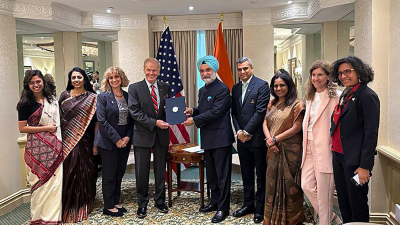India’s aspirations in the outer space and acceptance of the Artemis Accords have affirmed the country’s interest in building a greater relationship with the National Aeronautics and Space Administration (NASA) and its partners. As the space community lauds India’s acceptance of the Artemis Accords, let us know more about it.
Artemis Accords
The Artemis Accords are part of the Artemis programme, which is a mega-initiative by NASA with the aim to land the first woman and first person of colour on the Moon, make new scientific discoveries, and explore more of the lunar surface. Artemis is the name of the goddess of the Moon in Greek mythology and also the twin sister of Apollo.
The Artemis Accords were established in 2020 by NASA, the U.S., and seven other founding member nations – Australia, Canada, Italy, Japan, Luxembourg, UAE, and the U.K. This June 21, India became the 27th country to sign the Artemis Accords.
The Artemis Accords are a set of non-binding guidelines designed to guide civil space exploration and use in the 21st Century. It is a NASA-led effort to return humans to the moon by 2025, with the ultimate goal of expanding space exploration to Mars and beyond.
The Artemis Accords reinforce and implement key obligations in the 1967 Outer Space Treaty (which provided the basic framework for international space law). The accords also affirm the importance of the Rescue and Return Agreement opened in 1968, which emphasises the responsibility of nations to safely return astronauts and equipment to Earth.
Besides, the accords emphasise the need to preserve historically significant human or robotics landing sites, artefacts, spacecraft, and other evidence of activity on celestial bodies.
Outer Space Treaty
The Outer Space Treaty is an international treaty binding the parties to use outer space only for peaceful purposes. The treaty was enforced on October 10, 1967, after being ratified by the U.S., then Soviet Union, the U.K.. and several other countries.
The treaty prohibits countries from placing nuclear arms or other weapons of mass destruction in orbit, on the Moon, or on other bodies in space. Also, no country can claim sovereignty over the Moon or other celestial bodies. The countries are liable for any damage caused by objects launched into space from their territory.
India and the Artemis Accords
India’s Indian Space Research Organisation (ISRO) and NASA had been working together in several lunar missions. However, the cooperation was limited to sharing knowledge. With the signing of the Accords, India and the US will share data, technology, and resources, and work together in ensuring the safety and sustainability of exploring the Moon.
Picture Credit : Google





